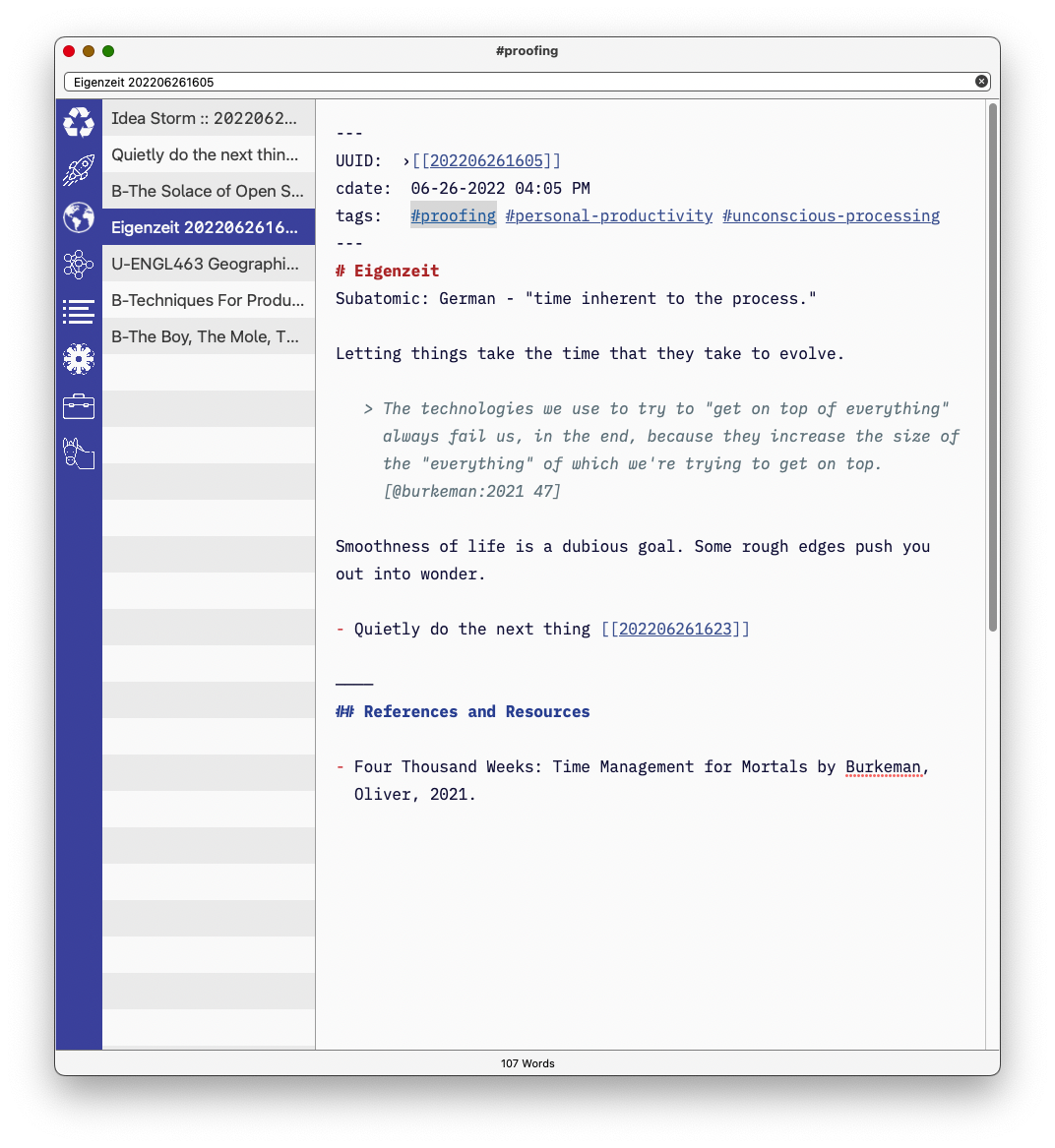Eigenzeit
I was exposed to this idea while reading Oliver Burkeman's Four Thousand Weeks and captured it in my ZK.
Not being a German speaker, I wonder about the nuances. Am I completely off base with my framing of the idea the word expresses? There might be an English word equivalent, but I don't know it. Is this a concept expressed with a word in other languages? Can any of you Germans help me fill out this idea?

Will Simpson
My peak cognition is behind me. One day soon, I will read my last book, write my last note, eat my last meal, and kiss my sweetie for the last time.
My Internet Home — My Now Page
Howdy, Stranger!

Comments
Eigenzeit is originally a concept of relativity theory. It refers to the fact that a moving object experiences time more slowly than the surrounding system that is not in motion. Eigenzeit is the time as experienced by the object in motion.
If you abstract from the origins in physics, then it's something like the time as it is personally experienced. "Time flies by..." as they say.
This blog post uses gardening tasks as a metaphor for Eigenzeit:
@Will there you have it, the term has different meanings even in German. Now to figure out if Burkeman referred to the physics term or the time sociology term.
More fascinating than I first thought. Motion is equal to evolution. Projects, relationships, plans, and knowledge evolve at their own speed, and time is the experience we have as objects in this process.
What is this experience called time like?
Are we talking about temporal time, clock time, or time as we commonly talk about time? Are we speaking of Hermann Minkowski's four-dimensional manifold of space/time or time as Atisha Dipamkara Shrijñana's "primordial naked awareness" of a moment-to-moment life?
Will Simpson
My peak cognition is behind me. One day soon, I will read my last book, write my last note, eat my last meal, and kiss my sweetie for the last time.
My Internet Home — My Now Page
I love metaphors! Thanks for sharing.
What I got from this.
The eigenzeit of a task is variable. It doesn't matter rather we interpret the task as fun, painful, exciting, boring, well done, or poorly done. Each has eigenzeit rather we acknowledge it or not. I wonder if we can and how much we can really influence the speed of eigenzeit?
Will Simpson
My peak cognition is behind me. One day soon, I will read my last book, write my last note, eat my last meal, and kiss my sweetie for the last time.
My Internet Home — My Now Page
Maybe I've gotten a little carried away. Coffee and One World Cafe have put me in philosophical mode. Thank you and @saschaz.
I'm anxious to hear from others, maybe some mathematicians or philosophers or Germans with a different view. How is eigenzeit talked about in other languages?
Will Simpson
My peak cognition is behind me. One day soon, I will read my last book, write my last note, eat my last meal, and kiss my sweetie for the last time.
My Internet Home — My Now Page
Now I'm inclined to exclaim, "eigenzeit!" whenever someone sneezes a well-executed sneeze, in its own time, of course. That reminds me of a ridiculous portmanteau word, transitgeist, which means "spirit of transportation."
GitHub. Erdős #2. Problems worthy of attack / prove their worth by hitting back. -- Piet Hein. Alter ego: Erel Dogg (not the first). CC BY-SA 4.0.
You mathematicians are a fun group with your imaginative lexicography. First Hermann Minkowski, with his eigenzeit, now you with transitgeist! I love it.
I think you just made that up to have fun.
A British campervan was the only hit inputting transitgeist into The Google.
Modern language in the Math/Science community has sanitized eigenzeit with the boring "proper time" expression.
"Eigenzeit!" does have a "Gesundheit!" ring to it. Twins. The two portmanteaus are sisters by different fathers.
Will Simpson
My peak cognition is behind me. One day soon, I will read my last book, write my last note, eat my last meal, and kiss my sweetie for the last time.
My Internet Home — My Now Page
I think you just made that up to have fun.
A British campervan was the only hit inputting transitgeist into The Google.
Despite the spoiler, with its singular Google hit on the word transitgeist, this was an invention of mine in the early days of the web. I had a short-lived web site called "New York Transitgeist," which was supposed to be an online database of parking spaces in Manhattan with broken meters. But it went nowhere since I had as much energy then as I do now, which is to say none at all.
Another phrase was independently invented, though years later: "Buddy, can you paradigm?" I can't prove it. A Google search turns up more than the search for transitgeist. The Internet has made life more difficult for portmanteaumimes.
GitHub. Erdős #2. Problems worthy of attack / prove their worth by hitting back. -- Piet Hein. Alter ego: Erel Dogg (not the first). CC BY-SA 4.0.